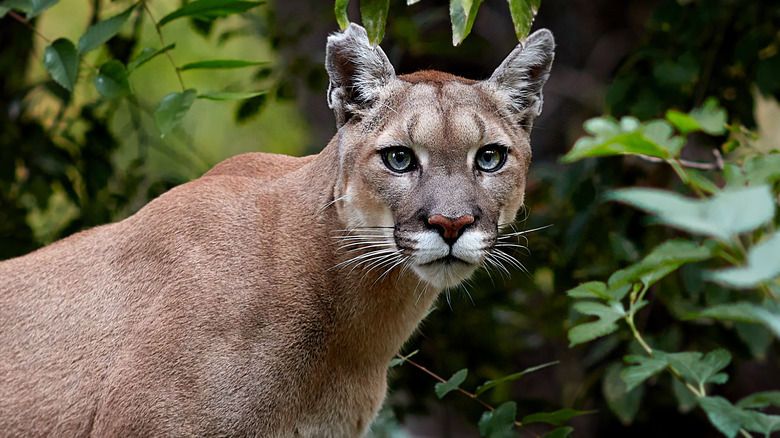The Reason Mountain Lions Are Dying From The Black Plague
First of all, are we talking about a mountain lion, cougar, puma, panther, painter, or catamount? And the answer is yes — we use all of those names for the same animal, according to The New York Times. Mountain lions are the second-largest cat in North America, topping out at 150 pounds for the males, 100 pounds for the females, per Animal Fact Guide. (The largest? Thanks for asking. According to Live Science, that's the jaguar, which easily reaches 200 and sometimes 300 pounds. That's a lot of kibble.) Second-largest or not (and it's not like you'd want to quibble over season stats with one), they range just about anywhere they can find shelter and food.
They were hunted out of the Eastern part of the continent, but they're doing well in western North America, even in the hill areas approaching the shores, in wee parts of Florida, and as far south as, well, "most" of South America. Cougars keep to themselves, interacting with other cougars only to mate. They're apex predators, preferring something large like deer, but also willing to consume smaller rodents — any port in a storm, right? And there we have it: cougars in the area of Yellowstone National Park have been testing positive for Black Plague for well over a decade, and diet might have something to do with it.
Diet has something to do with it
According to All That's Interesting, a recent study has shown that an alarming percentage of dead cougars in the Yellowstone and Jackson Hole areas have either died from plague or showed proof of exposure to the disease. The illness was probably acquired from rodents in the mountain lions' diet — plague is zoonotic, meaning that it travels between species, including human beings. As History Today reports, the 14th century outbreak killed an estimated 50 million people in Europe alone, often believed to have been spread by rats. Plague still pops up from time to time, though human infections are relatively rare these days.
Cougars aren't the only ones. In 2019 bubonic plague was found among prairie dogs in the Rocky Mountain Arsenal National Wildlife Refuge. One thing you don't have to worry about: Mountain lions are quiet. They neither roar nor scream. They do make a sort of purr-on-steroids sound. So that's kind of relaxing. From an apex predator.

